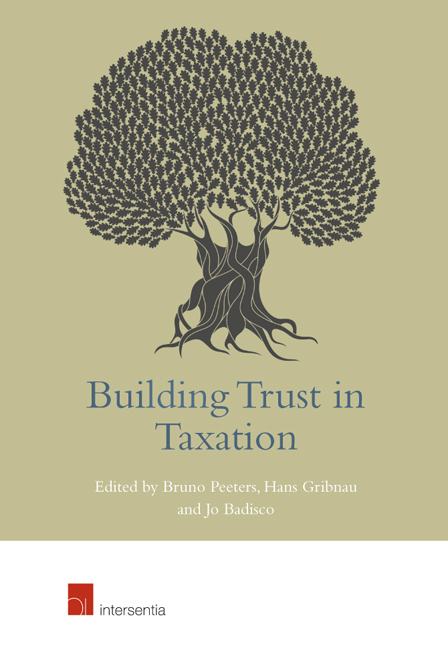Book contents
- Frontmatter
- Preface
- Contents
- List of Authors
- Introduction
- PART I TAXATION, STATE AND SOCIETY: RECIPROCITY AND THE LIMITS OF THE POWER TO TAX
- PART II Trust and morality: tax governance in need of transparency
- PART III International taxation: in search of democratic legitimacy
- PART IV Behavioural aspects of taxation and trust
- Public Attitudes Towards Redistribution Through Taxation
- Does Information about Wealth Inequality and Inheritance Tax Raise Public Support for the Wealth Taxes? Evidence from a UK Survey
Does Information about Wealth Inequality and Inheritance Tax Raise Public Support for the Wealth Taxes? Evidence from a UK Survey
from PART IV - Behavioural aspects of taxation and trust
Published online by Cambridge University Press: 21 September 2018
- Frontmatter
- Preface
- Contents
- List of Authors
- Introduction
- PART I TAXATION, STATE AND SOCIETY: RECIPROCITY AND THE LIMITS OF THE POWER TO TAX
- PART II Trust and morality: tax governance in need of transparency
- PART III International taxation: in search of democratic legitimacy
- PART IV Behavioural aspects of taxation and trust
- Public Attitudes Towards Redistribution Through Taxation
- Does Information about Wealth Inequality and Inheritance Tax Raise Public Support for the Wealth Taxes? Evidence from a UK Survey
Summary
ABSTRACT
While greater use of wealth taxes has been widely called for in recent academic and popular literature, they seem to be particularly unpopular among the public. In particular, inheritance tax is often singled out as the most disliked of all taxes. The unpopularity of wealth taxes matters because this undermines the use of these taxes as a way of potentially both reducing levels of wealth inequality and of providing alternative revenue streams to a Government in times of economic stress. But do the public really oppose wealth taxes from a position of adequate knowledge of these taxes – given their relatively limited use, and in inheritance tax ‘ s case, limited incidence? Rather, there is evidence that people are poorly informed about the extent of wealth inequality and the potential for wealth taxes to assist in improving equality. The research reported in this chapter explores whether information provision to correct false knowledge (or validate correct knowledge) about wealth inequality and inheritance tax could be a suitable, simple, intervention to help raise public support for the wealth taxes? This chapter reports results from a face-to-face survey of 2,019 adults aged 16 + in Great Britain carried out in July 2014. The survey shows that the simple provision of corrective/validating information prompted little change in the positive support for various wealth tax proposals currently being debated. In fact, there is evidence that some of the provision of information in fact decreased initial levels of comparative support. One implication resulting from this research is that policy-makers will have to engage directly with moral arguments that have been constructed that, arguably, misinform debates, or they must develop compelling narratives if there is a desire to build support for wealth taxes.
INTRODUCTION
While, in theory, most people appreciate the need for taxes within society as a ‘ necessary evil ‘, paying tax is perhaps understandably not an activity that will produce positive feelings in most payers. Within the range of taxes available to a government to apply however, wealth taxes appear to be particularly unpopular among the public.
- Type
- Chapter
- Information
- Building Trust in Taxation , pp. 335 - 354Publisher: IntersentiaPrint publication year: 2017
- 1
- Cited by



